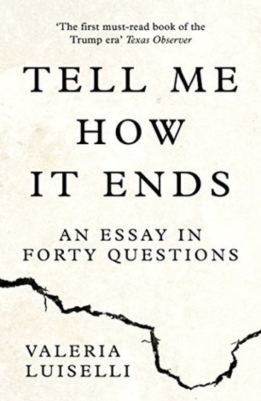 Tell Me How It Ends is a 100-page essay describing with “anger and clarity” the cruel and surreal way in which the US government treats refugee children–specifically ones from Honduras, El Salvador, and Guatemala, following the so-called “immigration crisis” of 2014, in which tens of thousands of children from these countries crossed the American border in the space of a few months. (Something which, I have to admit, I was completely unaware of before reading this book, and the fact that I live in the UK is only a partial excuse.) To a lesser extent, the book also denounces the horrors that prompted these children to leave their countries in the first place, as well as the brutal response in Mexico, the country that the vast majority of these children have had to cross in order to get to the US. But it’s of the US side of things that the author, novelist Valeria Luiselli, has direct experience: in 2015, she began volunteering as an interpreter for the children, many of whom speak little or no English. The book is loosely structured around the forty questions the US government requires the children to answer, in order to establish which ones have a better claim to asylum.
Tell Me How It Ends is a 100-page essay describing with “anger and clarity” the cruel and surreal way in which the US government treats refugee children–specifically ones from Honduras, El Salvador, and Guatemala, following the so-called “immigration crisis” of 2014, in which tens of thousands of children from these countries crossed the American border in the space of a few months. (Something which, I have to admit, I was completely unaware of before reading this book, and the fact that I live in the UK is only a partial excuse.) To a lesser extent, the book also denounces the horrors that prompted these children to leave their countries in the first place, as well as the brutal response in Mexico, the country that the vast majority of these children have had to cross in order to get to the US. But it’s of the US side of things that the author, novelist Valeria Luiselli, has direct experience: in 2015, she began volunteering as an interpreter for the children, many of whom speak little or no English. The book is loosely structured around the forty questions the US government requires the children to answer, in order to establish which ones have a better claim to asylum.
The title refers to the way Luiselli’s daughter, a child, reacts whenever her mother tells her about the individual stories of children she’s worked with. The stories are often complicated and upsetting, and, with few exceptions, Luiselli does not get to find out whether the children she helps get to stay. But her daughter wants a simple, comforting story, one she can understand, with an end (preferably a happy one) as well as a beginning and a middle. This child’s understandable need for a straightforward narrative is grotesquely mirrored by the US government’s questionnaire, which also attempts to place the children’s stories into easily comprehensible boxes, boxes that can be moved around and rearranged as if they actually were boxes instead of children. Even though some children are too small to understand what the questions mean. Even though some children may be too scared or ashamed to tell a complete stranger about the violent acts they’ve experienced or witnessed either before leaving their home countries or during the journey. Even though most children cannot give uncomplicated answers, because their lives–anyone’s lives–are complicated.
But the title could also be seen as an invitation to the reader. I’ll give you the beginning (the 2014 crisis) and middle (the US–and Mexican–response), Luiselli seems to be saying to the reader–you tell me how this story ends. Do we leave the system as it is, or do we try to change it? By showing examples–her own, her niece’s, her students’–of people who decided to something about this dire situation, volunteering and organising, Luiselli wishes to inspire us as well as elicit our anger and dismay. We live in dark times–but we don’t have to accept it.
I received an electronic copy of this book from the publisher via NetGalley, in exchange for an honest review.
Advertisements Share this:





